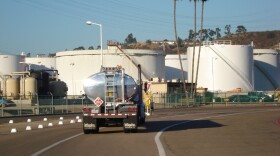
Amita Sharma
Investigative ReporterAs the public matters investigative reporter, Amita leads KPBS’ coverage on efforts to undermine democracy, including threats to public officials, bolstering the Big Lie, chipping away at voter’s rights, attempts to overturn election results, eroding institutions and weakening the government's capacity to do its job, as well as civic efforts to engage people with opposing views without rancor.
The goal of the position is to report on the stakes, from a San Diego County perspective, on the United States’ current political moment.
She has spent the last two years reporting on local threats to democracy, including regional extremism, the shrinking of local news coverage while the number of hyper partisan “news” websites grow, censorship at libraries and incivility at public meetings.
Her previous coverage includes: exposing abuses in local nursing homes at the height of the pandemic, including a serial rapist who had worked in several El Cajon facilities and was arrested following her reporting; unearthing a contract between the city of Chula Vista and Motorola that allowed the company to sell data collected by the Chula Vista Police Department; and reporting on discrimination and retaliation in the San Diego County Public Defender’s Office that led to court settlements and the retirement of the Public Defender.
-
Water pollution regulators and the city of San Diego are at odds over how best to clean up contaminated groundwater at Qualcomm Stadium. The two sides along with Kinder Morgan Energy - the company responsible for the cleanup - are set to meet today.
-
The Port of San Diego controls more than 5,000 acres of tidelands and 10,000 acres of the bay. The port is governed by seven unelected commissioners. They decide what to build on the waterfront, how to promote trade and how to keep the bay clean. Critics say that’s too much power with too little oversight.
-
The Port of San Diego’s cargo business has lost tens of millions dollars since 1993. And the marine division has sustained larger losses than the port has admitted to the public. Critics say the port’s Tenth Avenue Marine Terminal is partly to blame for the shortfalls.
-
The Port of San Diego has been keeping two different books for their expenses. One of them has not shown million-dollar losses for years.
-
The Port of San Diego is a public agency charged with managing the bayfront. It claims its top goals are strengthening its finances and building public trust. But over the past 15 years, the port has lost tens of millions of dollars in maritime operations. KPBS Reporter Amita Sharma found the port has not clearly documented those losses for the public.
-
The Port of San Diego manages the bay and is responsible for development and environmental protection of 33 miles of waterfront excluding tidelands administered by the United States Military. The port is made up of five cities: San Diego, National City, Chula Vista, Coronado and Imperial Beach. One of the port’s core missions is maritime trade.
-
The legal dispute over police drone footage stems from a lawsuit filed by Arturo Castanares, publisher of La Prensa San Diego.
-
KPBS Midday EditionAn investigation by CapRadio and NPR's California Newsroom has found that Gov. Newsom overstated, by an astounding 690%, the number of acres treated with fuel breaks and prescribed burns in forestry projects aimed at protecting the state’s most vulnerable communities.
-
This is a breaking news blog for all of the latest updates on the conviction of former Minneapolis police Officer Derek Chauvin on murder and manslaughter charges in the death of George Floyd.
- Experts concerned about white nationalist imagery in ICE recruitment materials
- New Terminal 1 at San Diego Airport opens to passengers
- Ramona cemetery district board member uncovers unusual compensation records
- Trump blames Tylenol for autism. Science doesn't back him up
- Animal shelter supervisor ‘out of the office’ after revelation of profane recording









